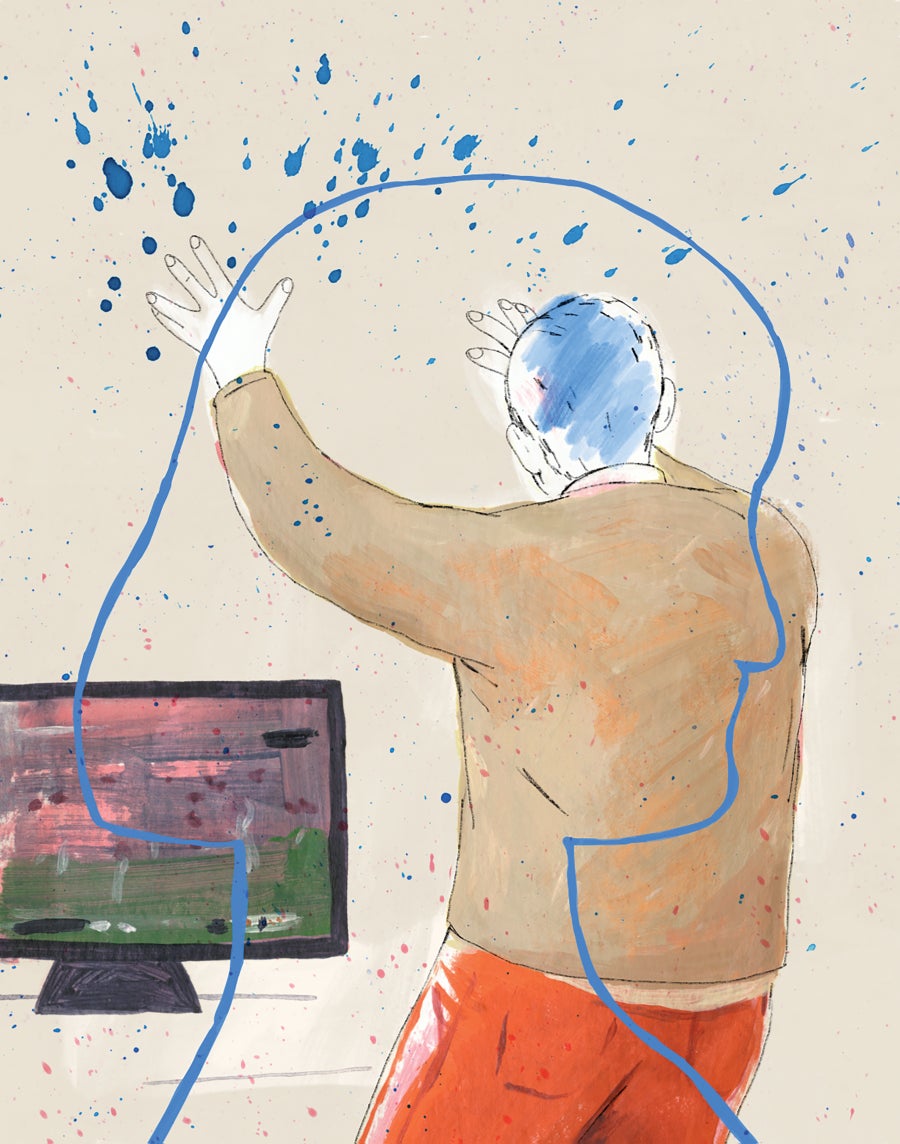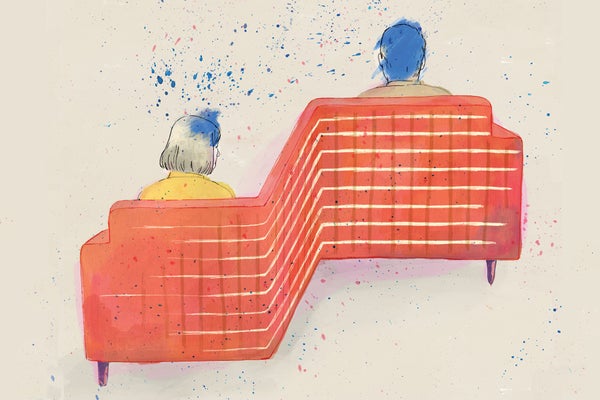Cathy is a woman in her late sixties, with a warm, tremulous voice. For six years, she had been taking care of her husband, Frank, who has Alzheimer’s. Recently, she had begun to berate herself for not being “cut from the same cloth as Mother Teresa”.
“You should know, I’m not a saint,” she said the first time we met.
I assured her I didn’t know any caregivers who were, nor did I expect to meet any.
“That’s good,” she said.
“The thing is,” she said, “every day with Frank is the same. He gets up, eats breakfast, reads the paper and naps. In the afternoon he grabs the remote, plants himself in his favorite chair, and turns on a game. If it isn’t the Mets, it’s the Jets. If it isn’t the Jets, it’s the Rangers or the Knicks or the Giants. And he’s not a passive spectator. Not Frank. He thinks he’s sitting above the dugout, and when someone fumbles a ground ball or misses a tag, Frank is on his feet, screaming at the poor guy. Or else, he’s leaning forward, predicting loudly when someone will screw up. ‘Don’t do it!’ he’d yell. ‘Wait! Wait!’”
If it isn’t sports, it’s a movie, any movie—that, too, presents an opportunity for Frank to participate. He yells at the actors, warning them of some impending disaster. Or he forecasts some dire plot twist, shaking his fist at the TV. And if an attractive actress shows up, he might suddenly shout, “That woman is about to take her top off! No one wants to see that!”
For months Cathy had put up with Frank’s behavior even though his impromptu yelling and ridiculous predictions sucked the joy out of being in the same room with him. But when he became fixated on thieves attempting to break into their house at all hours of the day and night, insisting that she lock the doors and shut all the windows, she had had enough. Her patience and good will had run out.
“No one is out to get you!” she shouted one night. “No one wants anything from you. No one is looking to break in. You hear me? You have dementia! Dementia!”
Cathy knew, of course, that she shouldn’t argue, that it was pointless to use logic and contradict her husband, but she couldn’t help herself.
“I always thought I was a sensitive person,” she mused. “Now I’ve become someone who kicks people when they’re down. I tell him Errol Flynn isn’t going to die. I tell him Doris Day isn’t going to take her blouse off. I tell him he has dementia. Why do I do that?”
Cathy is not alone. The vast majority of caregivers know full well that their spouses or parents are ill, yet they still behave in ways they know are counterproductive: arguing, blaming, insisting on reality, and taking symptoms personally. Yes, Cathy understood that she was dealing with a disease, with someone suffering from delusions and hallucinations, but when Frank, panicked by imaginary thieves, refused to crack open a window, Cathy fumed with resentment, and that feeling gradually overcame her desire to be understanding and reasonable.
Telling me all this, she shook her head in disbelief. “You know, he’s absolutely right. I don’t blame him for getting angry,” she said. “If someone had told me before Frank got Alzheimer’s that my job was to agree with him and accept his reality, I would have said, ‘Sure, what’s so hard about that?’ I mean, who cares that he thinks some jock is going to fall on his ass or that the weather girl is going to flash everyone? It’s not his fault. Who does this?”
“Just about every caregiver I talk to,” I said.
Although Cathy was taken aback by her own irrational behavior, it should not surprise us. Reasonableness is hardly our brain’s first priority. The brain, after all, is an ultrasocial organ that has innate expectations that are often not met when caring for Alzheimer’s patients. So when someone with whom we’ve had a close relationship develops Alzheimer’s, in many cases he or she begins to retreat into a world where we cannot follow. Not only do patients often not realize they have a neurological illness, they start speaking and behaving in ways that test our own sense of reality.
In Cathy’s case, Frank not only stopped expressing nuance and self-doubt, he also lost his ability to see his wife as a complete person. Cathy had become a prop, a vessel into whom he could pour all of his fixations, and so she found herself living with a humorless stranger with whom she had nothing in common.
It’s one of the heartbreaks of this disease. When someone we love develops cancer, patient and caregiver can commiserate, acknowledging the miseries of the disease while together experiencing, to some degree, a shared reality. But dementia at some point precludes this possibility. This strikes us as profoundly unfair because the collective reality that we once shared (and had come to expect) is now gone.

Carmen Segovia
No wonder that unfairness leaves us feeling resentful. It’s not because we don’t get our own way, and it’s not really about a shut window or who does the dishes. As social psychologist, Mathew Lieberman, explains, unfairness actually registers as a loss of social connection, and this feeling of isolation not only doesn’t feel good, it does not bring out the good in us. This is why caregivers invariably bristle when confronted with memory loss, delusions, and loss of judgment. But where outsiders may view this as an irrational reaction to neutral, straightforward symptoms, caregivers like Cathy experience such symptoms as relentless reminders that the emotional reciprocity that had once existed between her and Frank had disappeared—and there is nothing remotely fair about that.
Indeed, such unfairness is tantamount to loss. And though we may understand this intellectually, we are biologically disinclined to accept this. This sense of isolation is not a metaphor or a conceit, but a neurological cross that many caregivers must bear. Human beings, after all, are built to experience threats communally, through what psychologists call load sharing. As its name suggests, load sharing is a way of conserving energy by de-escalating anxiety and stress.
As a result, people in healthy and supportive relationships experience threats less intensely than those who feel isolated or alone. But this doesn’t mean that every close relationship is necessarily beneficial. If, like Cathy, we’re technically not alone but still feel alone, self-regulation becomes effortful, requiring mental energy that isn’t always available. One might think that drawing on such energy with an intact prefrontal cortex is no great matter. But the right ventrolateral prefrontal cortex, where our ‘“mental brakes’ ” can be found, is not always able to exercise self-control.
Self-control is, in fact, a limited resource precisely because it’s an effortful activity requiring the same kind of energy that our brain uses for any cognitive, physical or emotional activity, which means that there is precious little of it to go around. Every time caregivers like Cathy try to accommodate a patient’s delusions, they apply mental brakes, which costs energy. Every time they struggle to keep their anger in check, they are hampered by the very people responsible for depleting the energy they need to maintain such control.
No wonder that after a long day of submitting to existential and mundane forms of unfairness, caregivers can become as volatile as the people they care for.
Dementia disorders create a physiological ensnarement that calls for mental energy even as it makes hitting those mental brakes increasingly difficult. So on top of the heartache and helplessness the disease brings, caregivers are also beset by guilt. They regard their inability to adapt to the disease as a character flaw, and many assume that their difficulties in accepting a patient’s hurtful and frustrating symptoms is a matter of moral resolve, a question of will. If only they were “better people,” they tell themselves; if only they were stronger, more capable, more disciplined, they’d be able to handle better what the disease throws at them.
Sometimes the hardest part of listening to caregivers is knowing I can’t assuage this guilt. When caregivers ask me what they can do to help them adapt, my response often surprises them because it has nothing to do with their loved one’s mind, and everything to do with their own. I urge them to invest in their own brain, to understand that their behavior is not a matter of character weakness but a natural outcome of the healthy brain’s limitations.
Most caregivers have only a very rough understanding of what the disease is doing to their own brains. It’s important to let them know that their own physiology is part of the dynamic, forcing them to dip into those energy reserves required to accommodate strange and disturbing behaviors. Consequently, I urge them to give themselves a break, both figuratively and literally. I encourage them to take vacations, to spend time with friends, to find meaning and pleasure with people who can provide the reciprocity that is missing at home. By reducing their own stress, they will become better caregivers.
When I tell caregivers this, many of them nod politely but remain unconvinced. And even when they heed my advice and arrange to get away, their guilt rarely dissipates. In fact, self-care feels to them both counterintuitive and selfish. Why should they enjoy themselves when the person they care for has dementia and they’re not “there for them.”
Given how inextricably connected our brains are with others, the more compassion and understanding we have for our own needs and limitations, the more energy we have to appreciate the needs and limitations of those who depend on us. Self-care is the only way a caregiver’s mind can persevere.
This article is part of The New Age of Alzheimer’s, a special report on the advances fueling hope for ending this devastating disease.



